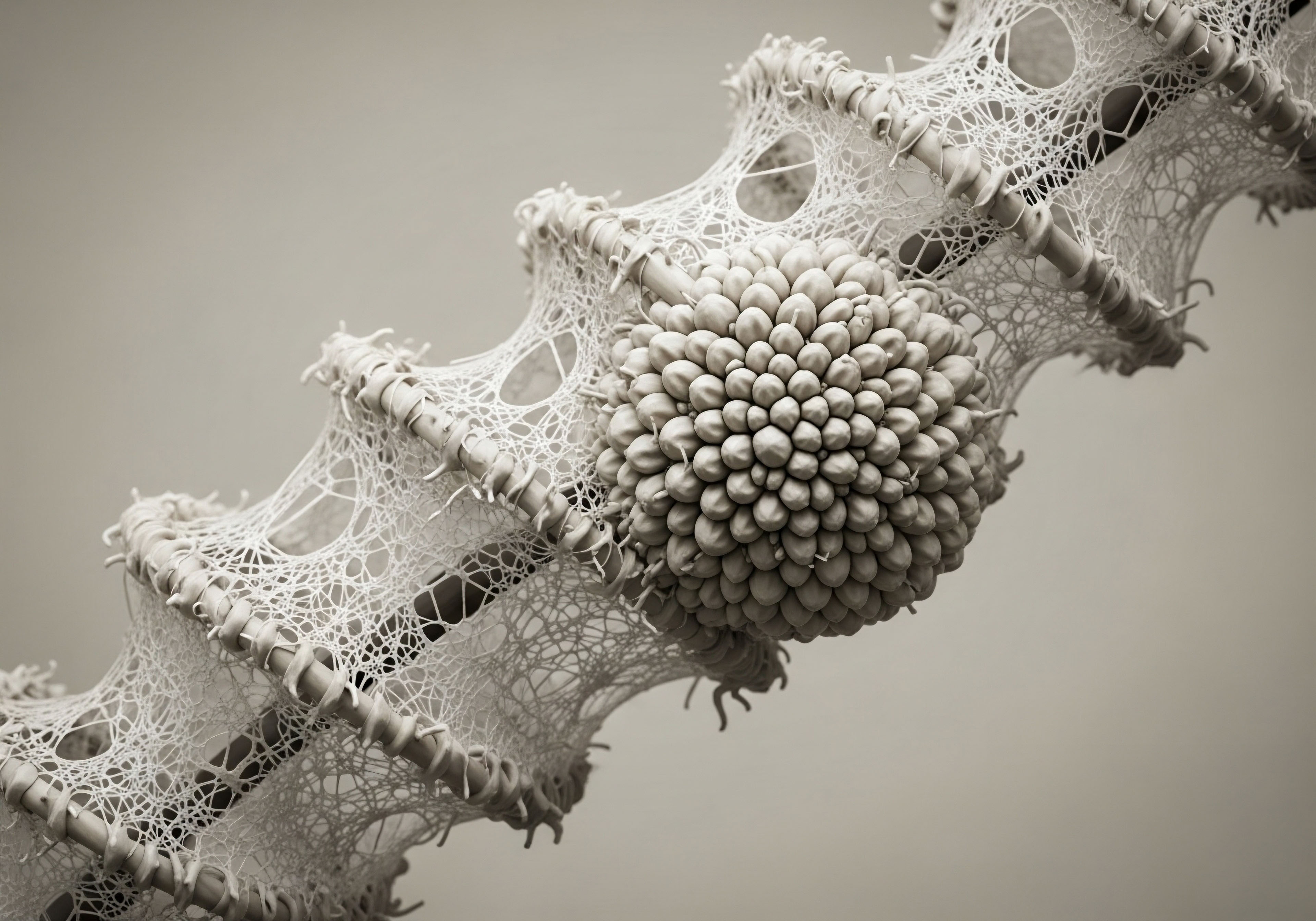

Fundamentals
That fleeting moment when a familiar name escapes you, or the reason you walked into a room vanishes, can be unsettling. It’s a deeply personal experience, this sense that the sharpness of your mind, a tool you’ve relied on your entire life, is somehow less reliable.
Many attribute this to the simple, inevitable process of aging. The full story, however, is woven into the intricate communication network of your body’s endocrine system. The hormones that orchestrated growth, reproduction, and energy throughout your life also play a profound role in maintaining the very structure and function of your brain. As these chemical messengers decline, so can the efficiency of the neural circuits they support.
Understanding this connection is the first step toward reclaiming cognitive vitality. Your brain is not a static organ; it is a dynamic environment, constantly remodeling itself in a process called neuroplasticity. Hormones like estrogen, testosterone, and progesterone are key regulators of this process.
They act as master gardeners in the brain, tending to neurons, encouraging new connections, and protecting against cellular stress. When their levels diminish, particularly during perimenopause, menopause, or andropause, the brain’s ability to adapt and perform can be affected. This can manifest as brain fog, difficulty with memory recall, or a dip in mental processing speed.
The intricate dance between your hormones and brain cells directly influences your cognitive sharpness and memory.
The conversation about cognitive function in later life is a conversation about the biology of the brain itself. The cells of your brain, your neurons, are rich with receptors for these hormones. Estrogen, for example, supports the health of the hippocampus, a brain region central to memory formation.
Testosterone has been shown to influence visuospatial abilities and executive function. Progesterone has a calming effect on the brain, which can indirectly support cognitive processes by improving sleep quality. The decline in these hormones represents a shift in the biochemical environment that has supported your brain for decades.
Hormonal optimization seeks to restore this supportive environment. By replenishing these crucial signaling molecules to more youthful levels, the aim is to provide the brain with the tools it needs to maintain its structural integrity and functional capacity.
This approach views cognitive changes not as an irreversible decline, but as a physiological challenge that can be addressed by understanding and supporting the underlying biological systems. It is a proactive stance, grounded in the principle that a balanced internal biochemistry is fundamental to a resilient and high-functioning mind throughout the lifespan.


Intermediate
To appreciate how hormonal optimization can influence cognitive function, we must look at the specific mechanisms of action within the central nervous system. Hormones are powerful signaling molecules that interact with cellular machinery to alter gene expression, protein synthesis, and neuronal communication. The clinical protocols designed to support cognitive health are based on replenishing these signals in a way that mimics the body’s natural rhythms and concentrations.

Protocols for Female Cognitive and Hormonal Health
For women navigating perimenopause and menopause, the fluctuating and eventual decline of estrogen and progesterone are primary drivers of cognitive symptoms. Clinical approaches are tailored to an individual’s specific needs and menopausal status.
- Estradiol Therapy ∞ Estradiol, the most potent form of estrogen, is known to have neuroprotective effects. It enhances cerebral blood flow, supports the survival of neurons, and modulates the activity of key neurotransmitters like acetylcholine, which is vital for memory and learning. In some studies, estrogen therapy, particularly when initiated close to the onset of menopause, has been associated with improved verbal memory.
- Progesterone’s Role ∞ Bioidentical progesterone is often prescribed alongside estrogen to protect the uterine lining. Its benefits extend to the brain. Progesterone interacts with GABA receptors, producing a calming, anxiolytic effect that can improve sleep quality. Since sleep is critical for memory consolidation, improved sleep architecture is an indirect but powerful mechanism for enhancing cognitive function. Some research suggests progesterone itself may have direct positive effects on verbal working memory.
- Testosterone for Women ∞ Low-dose testosterone therapy is increasingly recognized for its role in female health, primarily for improving libido. Its cognitive effects are an area of active research. Given testosterone’s role in energy and vitality, it may contribute to improved mental stamina and focus.

Protocols for Male Cognitive and Hormonal Health
In men, the gradual decline of testosterone associated with andropause can contribute to cognitive changes. Testosterone Replacement Therapy (TRT) aims to restore levels to a healthy physiological range.
| Component | Mechanism of Action | Clinical Consideration |
|---|---|---|
| Testosterone Cypionate | Weekly intramuscular injections restore serum testosterone levels, improving androgen receptor signaling in the brain, which is linked to executive function and memory. | Dosage is adjusted based on lab results to maintain optimal levels while minimizing side effects. |
| Anastrozole | An aromatase inhibitor that blocks the conversion of testosterone to estrogen, preventing potential side effects like gynecomastia and helping to maintain a balanced hormonal profile. | Used judiciously to avoid suppressing estrogen too much, as some estrogen is necessary for male health. |
| Gonadorelin | A GnRH analogue that stimulates the pituitary to produce luteinizing hormone (LH), which in turn signals the testes to produce their own testosterone. This helps maintain testicular size and function. | This is a key component for preserving endogenous testosterone production during TRT. |

Growth Hormone Peptides a New Frontier
Growth hormone (GH) levels also decline with age, and this decline is linked to changes in body composition, sleep, and potentially cognition. Growth hormone peptide therapy uses secretagogues, which are substances that stimulate the pituitary gland to release its own GH.
Peptide therapies like Sermorelin work by prompting the body’s own pituitary gland to produce growth hormone, supporting brain health and function.
Sermorelin and Ipamorelin are two such peptides. By promoting more youthful GH secretion patterns, particularly the natural pulse during deep sleep, these peptides can enhance sleep quality. This restorative sleep is essential for brain detoxification and memory consolidation. Furthermore, GH and its downstream mediator, IGF-1, have direct effects on the brain, promoting neurogenesis and protecting neurons. Early research suggests this pathway may enhance focus, memory, and overall mental acuity.


Academic
A sophisticated examination of hormonal optimization’s effect on cognition requires a systems-biology perspective, focusing on the molecular interactions within specific neural circuits. The brain is not merely a passive recipient of hormonal signals; it is an active endocrine organ itself, synthesizing neurosteroids and expressing a complex array of hormone receptors that modulate everything from synaptic plasticity to glial cell function. The efficacy of hormonal therapies hinges on this intricate interplay.

The Role of Neurosteroids in Synaptic Plasticity
The conversation about hormones and the brain must include neurosteroids, which are steroids synthesized de novo within the central nervous system. Molecules like allopregnanolone (a metabolite of progesterone) and DHEA are potent allosteric modulators of neurotransmitter receptors, particularly GABA-A and NMDA receptors. This modulation is a fundamental mechanism through which the hormonal milieu influences neuronal excitability and synaptic plasticity, the cellular basis of learning and memory.
Allopregnanolone, for instance, is a positive allosteric modulator of the GABA-A receptor, enhancing inhibitory neurotransmission. This action is critical for maintaining a balanced excitatory/inhibitory tone in the brain, preventing excitotoxicity, and promoting restorative sleep stages. The decline in progesterone and its subsequent loss of allopregnanolone production during menopause can disrupt this balance, contributing to anxiety, poor sleep, and cognitive deficits.
Research using functional MRI has shown that progesterone administration can increase activation in the prefrontal cortex and hippocampus during memory tasks, suggesting a direct enhancement of the neural circuits underlying cognitive processes.

What Is the Critical Window Hypothesis?
The timing of hormone therapy initiation is a subject of intense academic debate, encapsulated by the “critical window” hypothesis. This theory posits that the neuroprotective benefits of estrogen therapy are most pronounced when initiated close to the onset of menopause. During this period, the brain’s estrogen receptors are still healthy and responsive.
If therapy is initiated years after menopause, the underlying neural architecture may have already undergone atrophic changes, and introducing estrogen at this later stage may not yield the same benefits and could even be detrimental in some cases.
The Women’s Health Initiative Memory Study (WHIMS) provided data that, at first glance, seemed to contradict the neuroprotective role of hormones, showing an increased risk of dementia in older women who began combined estrogen-progestin therapy late in life. However, a more detailed analysis supports the critical window hypothesis.
Subsequent studies and meta-analyses have indicated that when initiated in perimenopause or early menopause, hormone therapy is associated with a decreased risk of dementia and improvements in specific cognitive domains like verbal memory.
| Hormone | Primary Brain Regions of Action | Associated Cognitive Functions | Mechanism of Neuromodulation |
|---|---|---|---|
| Estradiol (E2) | Hippocampus, Prefrontal Cortex, Amygdala | Verbal Memory, Executive Function, Mood Regulation | Modulates synaptic density, enhances cholinergic activity, promotes neurogenesis. |
| Progesterone (P4) | Cortex, Hippocampus, Hypothalamus | Verbal Working Memory, Sleep Regulation, Anxiolysis | Metabolizes to allopregnanolone, a potent GABA-A receptor modulator. |
| Testosterone (T) | Hypothalamus, Amygdala, Hippocampus | Visuospatial Skills, Attention, Mental Stamina | Acts on androgen receptors; can be aromatized to estradiol in the brain. |
| Growth Hormone (GH) / IGF-1 | Hippocampus, Cortex | Memory Consolidation, Processing Speed, Neuroprotection | Promotes neuronal survival, supports neuroplasticity, enhances restorative sleep. |

How Does Testosterone Affect Male Brain Aging?
In men, testosterone exerts its cognitive effects through multiple pathways. It can act directly on androgen receptors, which are abundant in brain regions critical for memory and attention. Additionally, testosterone serves as a prohormone, as it can be converted directly within the brain to estradiol via the enzyme aromatase.
This locally produced estradiol then acts on estrogen receptors, providing neuroprotective benefits. Therefore, male cognitive function relies on a balance of both androgenic and estrogenic signaling within the brain. Clinical trials have shown mixed but promising results. Some studies report that testosterone therapy in hypogonadal men improves global cognition, attention, and memory, particularly when combined with lifestyle interventions.
The variability in outcomes across studies highlights the complexity of the issue, suggesting that factors like baseline cognitive status, dosage, and duration of therapy are critical variables.

References
- Berent-Spillson, A. et al. “Distinct cognitive effects of estrogen and progesterone in menopausal women.” Psychoneuroendocrinology, vol. 59, 2015, pp. 25-36.
- Resnick, S. M. et al. “Effects of Testosterone Therapy on Cognitive Function in Aging ∞ A Systematic Review.” Cognitive and Behavioral Neurology, vol. 30, no. 1, 2017, pp. 1-20.
- Gleason, C. E. et al. “Effects of Hormone Replacement Therapy on Cognitive Performance in Women.” JAMA, vol. 285, no. 11, 2001, pp. 1487-1495.
- Brinton, R. D. “Neurosteroids and the injured brain ∞ A new hope for repair.” Nature Reviews Neuroscience, vol. 14, no. 11, 2013, pp. 789-800.
- Maki, P. M. and Henderson, V. W. “Hormone therapy, dementia, and cognition ∞ the Women’s Health Initiative Memory Study.” Annals of the New York Academy of Sciences, vol. 1262, 2012, pp. 60-70.
- Janjarasjitt, M. et al. “Cognitive response to testosterone replacement added to intensive lifestyle intervention in older men with obesity and hypogonadism ∞ prespecified secondary analyses of a randomized clinical trial.” The American Journal of Clinical Nutrition, vol. 114, no. 5, 2021, pp. 1625-1634.
- Vitiello, M. V. et al. “Treating age-related changes in somatotrophic hormones, sleep, and cognition.” Dialogues in Clinical Neuroscience, vol. 3, no. 3, 2001, pp. 229-236.
- Calabrò, R. S. et al. “Gender and Neurosteroids ∞ Implications for Brain Function, Neuroplasticity and Rehabilitation.” International Journal of Molecular Sciences, vol. 24, no. 5, 2023, p. 4838.
- Hogervorst, E. et al. “The role of sex steroid hormones in cognition.” Nature Reviews Endocrinology, vol. 6, no. 10, 2010, pp. 565-577.
- Morrow, A. L. et al. “Neurosteroid Actions in Memory and Neurologic/Neuropsychiatric Disorders.” Frontiers in Endocrinology, vol. 11, 2020, p. 596.

Reflection
The information presented here forms a map, illustrating the deep biological connections between your endocrine system and your cognitive vitality. This knowledge is a powerful tool, shifting the perspective from one of passive acceptance of age-related changes to one of proactive engagement with your own physiology.
Your personal health narrative is unique, written in the language of your specific biochemistry and life experiences. Understanding the principles of hormonal influence allows you to ask more informed questions and become a collaborative partner in your own wellness. The path forward involves looking inward, armed with this new understanding, to chart a course toward sustained mental clarity and function for years to come.



